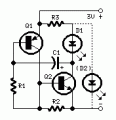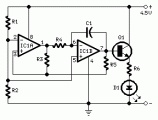FREE
circuits!
LED and light circuit diagrams
November 11, 2010
The basic circuit illuminates up to ten LEDs in sequence, following the rhythm of music or speech picked-up by a small microphone. The expanded version can drive up to ten strips, formed by up to... [more]
October 31, 2010
This schematic is version of a simple 10 LED chaser. There is no 555 timer used because at my local electronics store they are over $4 Cdn. Instead, an oscillator made up of two sections... [more]
October 29, 2010
Minimum parts counting Designed for 3V battery operation [more]
October 29, 2010
The purpose of this circuit was to create a ring in which LEDs or Lamps illuminate sequentially. Its main feature is a high versatility: you can build a loop containing any number of LEDs or... [more]
October 27, 2010
This circuit operates a LED in pulsing mode, i.e. the LED goes from off state, lights up gradually, then dims gradually, etc. [more]
October 27, 2010
A common problem with small torches is the short life-span both of the batteries and the bulb. The average incandescent torch, for instance, consumes around 2 Watts. The LED Torch in Fig. 1 consumes just... [more]
October 27, 2010
This circuit uses an MC3392 low side protected switch and an MC1455 timing circuit to form an automotive instrumentation panel lamp dimmer control. The brightness of incandescent lamps can be varied by Pulse Width Modulating... [more]
October 16, 2010
There are times when a little light inside the car would greatly assist one of the passengers but the dome light is too bright for safe driving. [more]
October 15, 2010
This one uses a much more powerful "horse shoe" Xenon tube which produces more light. You can also control the flash rate up to about 20Hz. Do not look directly at the flash tube when... [more]
October 15, 2010
This simple circuit drives 6 LEDs in 'Knightrider scanner mode'. Power consumption depends mainly on the type of LEDs used if you use a 7555 (555 CMOS version). [more]










 This category
This category